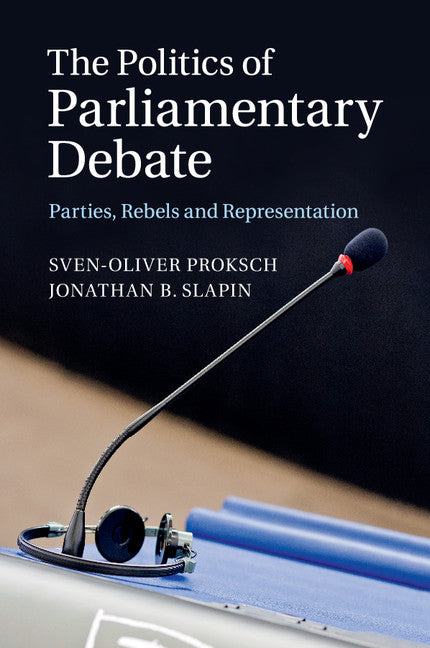Freshly Printed - allow 8 days lead
Couldn't load pickup availability
The Politics of Parliamentary Debate
Parties, Rebels and Representation
This book explains how parties and their members of parliament structure parliamentary debate, providing novel insights into intra-party politics and representation.
Sven-Oliver Proksch (Author), Jonathan B. Slapin (Author)
9781107421073, Cambridge University Press
Paperback / softback, published 26 November 2015
224 pages, 25 b/w illus. 35 tables
23 x 15.3 x 1.4 cm, 0.34 kg
'This is a fascinating book. The authors formulate a simple and plausible theory about what is at stake in parliamentary debates, for parties and individual legislators. The empirical evidence is based on an amazing set of comparisons: across countries, across parties, over time, across types of MPs, across time for the same individual legislators. This is social research at its very best.' André Blais, University of Montreal
Parliamentary debate is a fundamental aspect of democratic law-making. While law makers everywhere seek to express their views in parliament, there are large discrepancies in who has access to the floor across political systems. This book explains how parties and their members of parliament (MPs) structure parliamentary debate. Parties may actively seek to prevent some members from taking the floor while promoting opportunities for others. In doing so, they attempt to control the message that their partisans convey in parliament. The authors provide a theoretical model to explain the design of procedural rules in parliament, how the party leadership interacts with rebel backbenchers, and how MPs represent voters. The book explores political institutions, intra-party politics, electoral politics and legislative behavior. It develops and tests a new theory of parliamentary debate, using data from the UK, Germany, New Zealand and the European Parliament.
Introduction
Part I. Modeling Parliamentary Debate: 1. A theory of parliamentary debate
2. Empirical implications
3. Research design
Part II. Empirical Studies of Parliamentary Debate: 4. Debates and institutions
5. Debate participation: Germany and the UK
6. Dissent in parliament and the media: Germany and the UK
7. Candidate selection and debate participation: a European perspective
8. New Zealand: changing institutions
Conclusion.
Subject Areas: Central government [JPQ], Political structure & processes [JPH], Political science & theory [JPA], Politics & government [JP], Social issues & processes [JFF]


